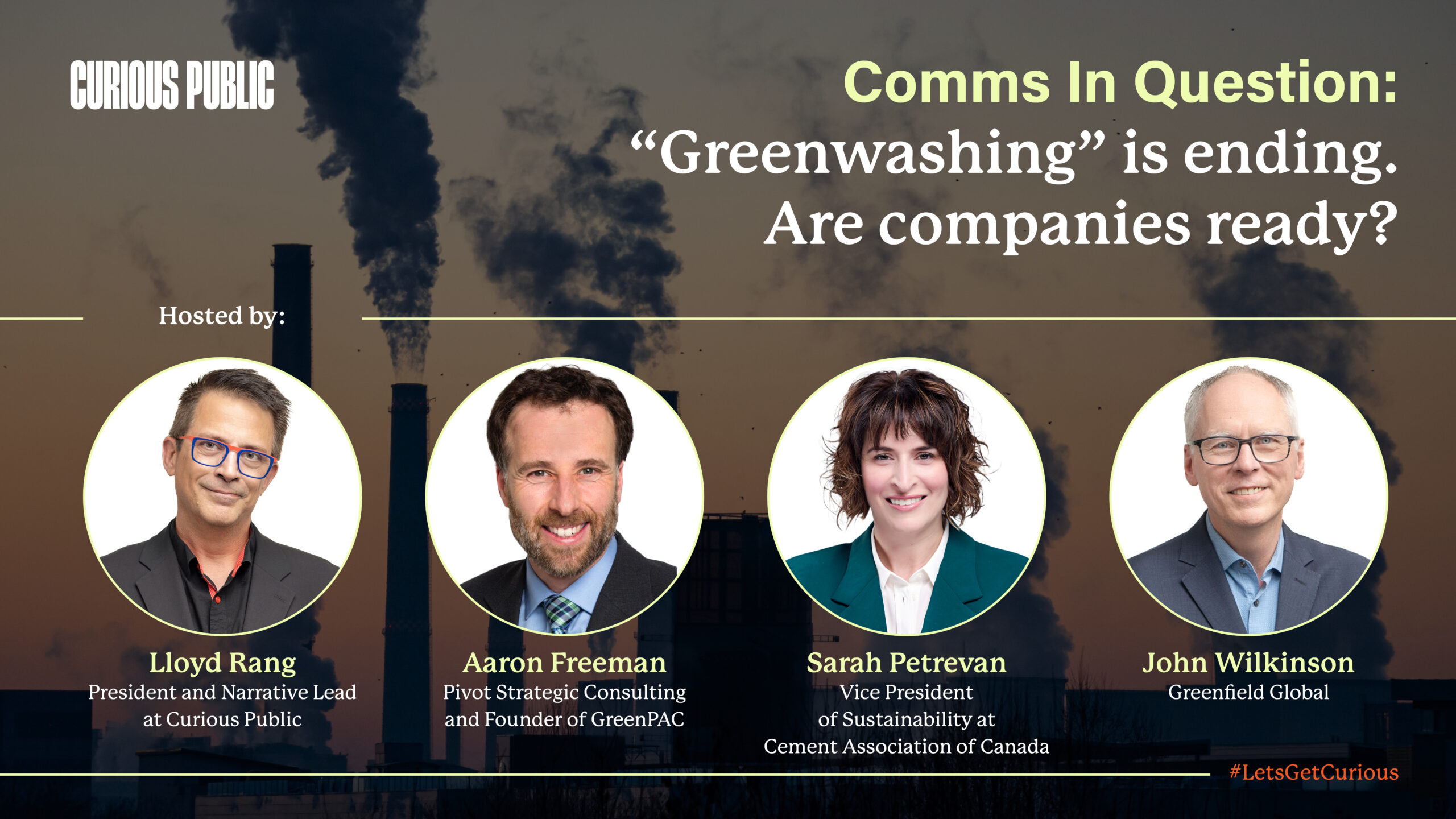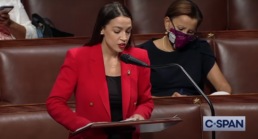That was the advice given to professional communicators by Sarah Petrevan, VP of Sustainability for the Cement Association of Canada, in our most recent episode of Comms In Question: Greenwashing is ending. Are companies ready? Lloyd Rang hosted our webinar and asked our panel of experts for their insights into Comms professionals’ role in reducing ‘greenwashing.’
Our guests talked about everything from the Volkswagen “clean diesel” scandal to the government and policy’s role in reducing greenwashing to what makes a sustainability claim legitimate or smoke and mirrors. If you didn’t catch the conversation live, you can watch the recording here.
Why is Greenwashing ending? And What Do Comms Professionals Need to Know?
When a company’s marketing and external communications advertise unsubstantiated claims about its stewardship of the environment or its sustainability efforts, that’s greenwashing.
But a big push to end this practice is coming from the International Sustainability Standards Board (ISSB)’s new global regulations. These new regulations require publicly traded companies to report their sustainability risks as part of their financial reporting, which means their sustainability efforts become publicly available. So, just like a company can’t report false earnings to deceive investors, the same will now be true about its sustainability track record.
It’s not a silver bullet, but it’s a big change. That’s why Marketing and Communications professionals will have to understand these regulations.
Our panelists also pointed out that many small businesses are the suppliers to those publicly traded companies to whom these regulations will now apply. The ISSB regulations and many others take into account the full supply chain, which means these regulations will have a ripple effect. And many small businesses will have to substantiate their sustainability claims if they want to remain suppliers to these larger companies.
How Can Comms and Marketing Professionals Responsibly ‘Talk Green’?
Our panelists each shared their advice for Marketing and Communications professionals wanting to responsibly talk about their organization’s sustainability efforts in this new era.
1. Trust but verify.
John Wilkinson, Ontario’s former Minister of Research and Innovation, Minister of Revenue and Minister of the Environment, quoted Ronald Regan in his advice to Marketing and Communications professionals. “If you want to be trusted,” said Wilkinson, “your claims need to be verified.”
Just like journalists, we have to ask the fundamental W5 questions of our organizations if we want to make sustainability claims. For example, if your organization wants to say it’s going to be NetZero by 2030, we have to dig into that statement just like any reporter would.
It’s in everyone’s best interest that the Marketing and Communications professionals ask these tough questions of leadership before the media does because, as Wilkinson reminds us from the Volkswagen case, “Greenwashing happens, but if you get caught, it costs you a lot in money and reputation, and it can threaten the survival of your company.”
2. Real-world results. Genuine commitment. And beyond ‘box checking.’
Aaron Freeman, the owner of Pivot Strategic Consulting and founder of GreenPAC, warned Marketing and Communications professionals and sustainability experts against the temptation to oversimplify the complex and ‘box check’.
Sustainability involves complex ethical, social and environmental practices. Yet the many different sustainability ranking systems measuring these efforts can give a wide range of results, according to Freeman. “The same company,” he says, “gets dramatically different scores depending on which ranking system you’re looking at.”
Freeman explains that this can be a result of organizations satisfying the ranking systems and potentially losing sight of the greater motivation behind them. “It’s sort of a corporate equivalent of ‘teaching to the test,’” he says.
Freeman advises us: “The leaders are those that ensure the company practices are making a real difference in the world. And the communications narrative has to tell that story in ways that are both quantifiable and genuine.”
3. Be impeccable.
Sarah Petrevan reminds us that our work should be spotless. And that means doing the work. Petrevan advises us to do our research so we can deeply understand what’s behind the messaging and statements we’re putting out on behalf of our organizations. That means we have to talk to the sustainability teams or subject matter experts – ask smart questions and distill answers without sacrificing nuance.
Petrevan also points out that sustainability is now no different from our other significant responsibilities in communications. “Just like [Comms professionals] have to verify financial statements or mergers and acquisitions or any of these things before they go out [to the public]. Now [they] have to verify and be honest and truthful [about sustainability] because now there are repercussions.”
Our work as Marketing and Communications professionals is rooted in truth-telling. We should be the trusted liaison between organizations and the public. Therefore, we are responsible for ensuring that the organizations we represent speak with integrity, honesty and transparency about their sustainability actions. So, the question isn’t “Will you” but rather “Are you ready” to help end ‘greenwashing’?
Check out our full conversation to learn more.
Thank you again to our panelists, Aaron Freeman, Sarah Petrevan and John Wilkinson.
Shannon Currie
Senior Consultant and Writer at Curious Public.



